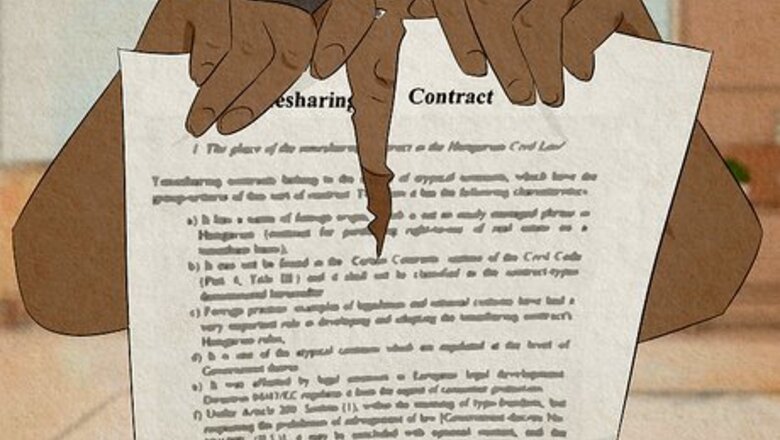
views
- Timeshare cancellation means exiting a timeshare purchase without penalty and being released from the contract with a full refund.
- Most states require buyers to cancel a timeshare during the rescission period. Rescission time frames vary by state, but it’s usually 3-15 days after purchase.
- Type up an official cancellation letter and send it via certified mail to the timeshare company before midnight on the last day of your state’s rescission period.
What is timeshare cancellation?
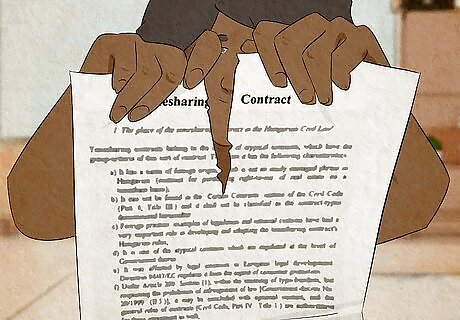
Timeshare cancellation is exiting a timeshare contract without penalty. Purchasing a timeshare is a significant investment, and some people change their minds about it after putting down the initial deposit and signing the contract. Cancelling a recent timeshare purchase without penalty means you’re released from your contract with a full refund, and it's possible as long as you act quickly. You're not legally obligated to provide a reason or justification for your cancellation to the seller.
How long do you have to cancel a timeshare?

Most states require buyers to cancel a timeshare within 3 to 15 days. After purchasing a timeshare, you enter a legally mandated “cooling off” or “rescission” period during which time you’re legally allowed to back out of the timeshare—no questions asked. The exact time frame varies by state, but most states allow somewhere between 3 to 15 days for rescission. You must send a formal notice of cancellation to the seller within the rescission period to be released from your contract without penalty. For example, in Colorado, a buyer has 5 days to rescind a timeshare agreement. In Washington, you have 7 days.
How does timeshare cancellation work?

Examine the timeshare contract to find your state's rescission period. Your state’s rescission time frame is usually noted somewhere on the contract, although it might be buried in the fine print. If you can’t find the information, look up your state’s specific laws about rescission time periods online. Sellers may include special instructions for cancellation in the contract itself (again, check the fine print). Be sure to follow their specific instructions exactly. For example, some companies require cancellation letters to be delivered via certified or registered mail.
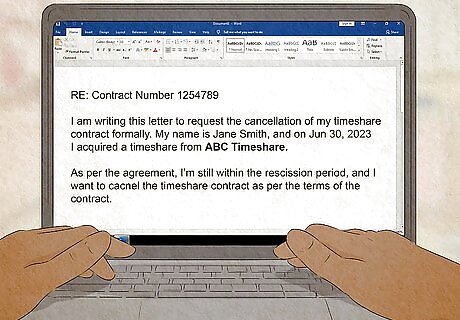
Type up an official cancellation letter as soon as possible. Even if your state allows you to cancel a contract verbally, it's important to send your cancellation notice in writing so that you have a paper trail and proof that you acted in accordance with state laws. After you write your cancellation letter, print it out so can you mail a hard copy to the timeshare company. Be sure to print out a few extra copies of the letter and keep them for your own records.

Mail the letter via certified mail before the rescission period ends. In most states, a timeshare cancellation is effective on the date the cancellation letter is postmarked. As long as the postmarked date is before midnight on the final day of your state's rescission period, you shouldn’t have any problems completing the cancellation process. Sending the letter via certified mail ensures you get a return receipt proving that you sent the letter within the appropriate rescission period.
What to Include in a Cancellation Letter
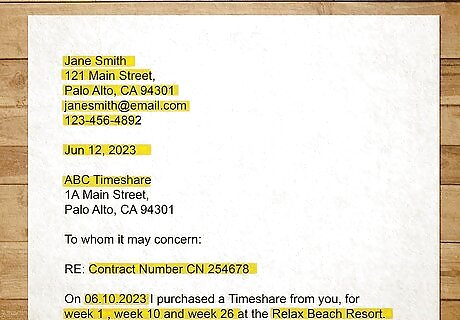
State your intention to cancel clearly and include all contract details. You don't have to give a reason for canceling the timeshare in your cancellation letter, but it’s important to note in the first 1-2 sentences that the purpose of the letter is to rescind the contract. Go with something very direct like, "I am contacting you within the rescission period to cancel this timeshare contract." Additionally, include the following details in your letter: Current date Your name as it's written on the contract Your address, phone number, and email Name of the timeshare company Brief description of the timeshare (taken from the timeshare paperwork) Date the timeshare was purchased
What if the cancellation window has passed?

Contact the timeshare company directly about exit solutions. Let them know that you want to work on an exit strategy and ask if they have deed-back or surrender programs that you can take advantage of. The timeshare company (or developer) will explain the exit solutions they offer and what criteria you need to meet. You won't be able to recoup any money you've paid so far, but deed-back and surrender programs allow you to get out of the timeshare without paying it off. Some states allow cancellations after the rescission deadline, but you’ll need to hire an attorney and the process may take a while. Consider renting out your timeshare to help pay it off (just ask the timeshare developer if it's allowed). Be wary of third-party timeshare exit companies—most are scams. They often ask clients to pay a large sum upfront and then never deliver on their services. If you've paid off the timeshare completely, consider giving it to a friend or family member. You won't recoup any money, but they'll at least take over the annual maintenance fees on the property and be responsible for it moving forward.


















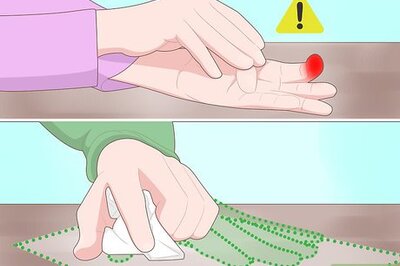

Comments
0 comment